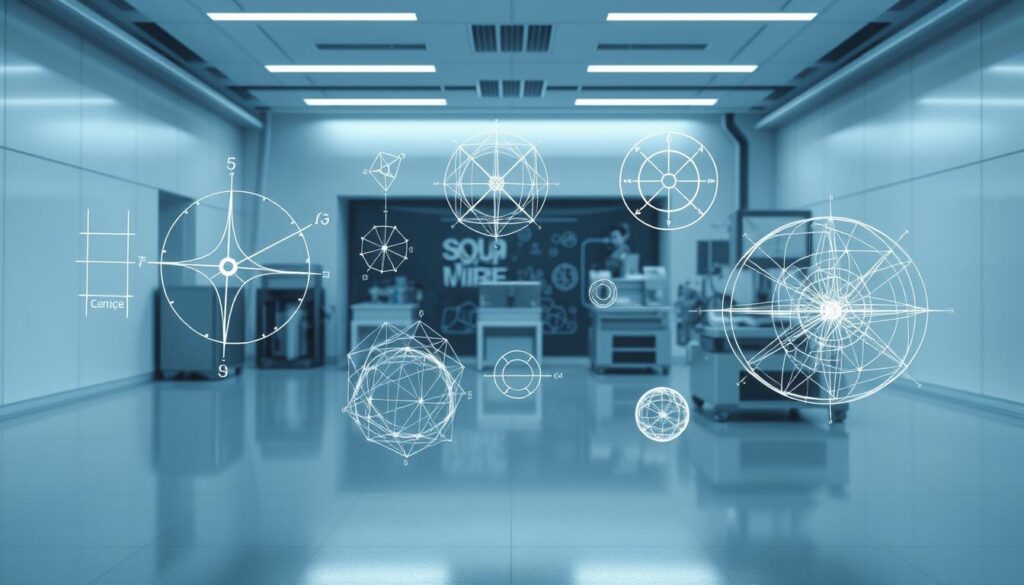Ever thought about a field that connects pure science with the latest technology? What is Engineering physics is a fascinating area that turns scientific ideas into practical innovations. Since 1861, it has grown into a field that explores scientific principles deeply.
Engineering physics is a special mix of science and engineering. It combines physics, math, chemistry, and biology with various engineering fields. It’s not just about learning science. It’s about using that knowledge to tackle tough tech problems in many areas.
Imagine a job where you can explore quantum mechanics, create new technologies, and work on major projects. Engineering physics gives you a strong base in science and practical engineering skills. It’s a chance to dive into the unknown and make a real difference.
Engineering physics graduates lead in tech innovation. They work in engineering, applied science, and research. It’s a thrilling path for those eager to explore and push scientific limits.
As tech keeps changing fast, engineering physics is key. It helps students become skilled problem-solvers and creative thinkers in our complex world.
Understanding Engineering Physics Fundamentals
Engineering physics is where science meets technology. It’s a field that connects theoretical physics with real-world engineering. This makes it a unique way to solve complex problems.

At its core, engineering physics uses science to create new technologies. People in this field learn how to apply scientific theories to solve problems in many industries.
Core Principles and Concepts
Engineering physics covers many important scientific areas:
- Electricity and magnetism
- Quantum mechanics
- Mechanics
- Thermodynamics
- Material science
- Optics
Integration of Pure Science and Engineering
Engineering physics is special because it combines theory and practical skills. Graduates get an innovative mindset. They can solve tough problems in fields like:
- Aerospace
- Electronics
- Renewable energy
- Nanotechnology
- Telecommunications
Historical Development of the Field
Engineering physics started in 1861 with J. Frick’s work. Since then, it has grown a lot. Programs like IIT Madras, started in 1959, keep pushing the limits of science and education.
Now, engineering physics is a key path for those who want to turn ideas into real innovations. These innovations change our world.
What Is Engineering Physics and Its Modern Applications

Engineering physics is a field that connects pure science with practical engineering. It offers a unique way to tackle complex technological problems in many industries.
So, what is engineering physics? It’s a mix of physics and engineering that leads to new technologies. It helps experts create innovative solutions in various fields.
- Nanotechnology research and development
- Quantum computing systems
- Renewable energy technologies
- Advanced aerospace engineering
- Medical technology innovations
The study of engineering physics covers many important areas:
| Discipline | Key Focus Areas |
|---|---|
| Microelectronics | Circuit design, semiconductor technologies |
| Photonics | Optical systems, laser technologies |
| Materials Science | Advanced material development, structural engineering |
Students in engineering physics get a tough but rewarding education. They take 12 core physics courses. These courses focus on solving real-world problems through projects.
After graduation, you’ll have many career paths open to you. You’ll play a key role in pushing technology forward. This includes work in AI and sustainable energy.
The Unique Blend of Physics and Engineering Education
An engineering physics degree is a unique way to learn technical skills. It mixes deep math with the latest in engineering. This mix gets students ready for tough tech challenges.
Engineering physics students get a wide range of courses. They learn both the science behind things and how to apply it. They dive deep into many technical areas.
Mathematics and Physics Foundation
The math and physics part of an engineering physics degree is very strong. Students take on tough classes like:
- Calculus through advanced differential equations
- Quantum mechanics
- Thermal physics
- Applied mathematical modeling
Engineering Core Components
Engineering skills are also a big part of the degree. Students learn to design and work with:
- Electronic sensor design
- Automated systems engineering
- Mechanics and fluid dynamics
- Robotics and computational systems
Advanced Technical Coursework
What really sets engineering physics apart is the advanced coursework. Students work on big projects. This gets them ready for real-world engineering problems.
| Course Category | Key Focus Areas | Skill Development |
|---|---|---|
| Mathematical Sciences | Advanced Calculus | Analytical Reasoning |
| Physics Specialization | Quantum Mechanics | Theoretical Modeling |
| Engineering Applications | Robotics Design | Practical Problem Solving |
Engineering physics graduates start at $76,000 a year. They have many career paths in tech.
Career Opportunities in Engineering Physics
Engineering physics graduates have a wide range of career options. They combine scientific knowledge with technical skills. This makes them valuable in many fields, from research to technology development.
Engineering physics careers cover exciting areas:
- Research and Development in high-tech companies
- Aerospace technology design
- Telecommunications infrastructure
- Energy sector innovations
- Advanced manufacturing technologies
Your training in physics and engineering is highly sought after. Employers value your problem-solving skills. These skills are crucial in industrial research and development.
| Industry Sector | Potential Roles | Median Salary Range |
|---|---|---|
| Aerospace | Systems Engineer | $95,000 – $120,000 |
| Telecommunications | Network Design Engineer | $85,000 – $110,000 |
| Energy | Research Physicist | $90,000 – $135,000 |
| Technology | Product Development Specialist | $100,000 – $145,000 |
Your background in engineering physics is a stepping stone to advanced studies. You can pursue highly ranked graduate programs in physics or engineering. Your training prepares you to handle complex technological challenges in various sectors.
Engineering Physics vs Traditional Engineering Degrees
Exploring science and technology careers means understanding the differences between engineering physics and traditional engineering degrees. Your education can greatly affect your future job opportunities.
Engineering physics is a unique field that combines pure science and practical engineering. It offers a broader and more flexible education than traditional engineering.
Key Curriculum Differences
- Broader scientific foundation in physics and mathematics
- More theoretical and research-oriented coursework
- Emphasis on advanced computational and analytical skills
- Interdisciplinary problem-solving approaches
Specialized Focus Areas
Engineering physics degrees focus on emerging technologies like:
- Quantum computing
- Nanotechnology
- Advanced materials science
- Renewable energy systems
Industry Recognition
| Degree Type | Average Salary | Job Market Demand |
|---|---|---|
| Traditional Engineering | $90,000 | High |
| Engineering Physics | $143,000 | Growing |
Employers see the value in physics and engineering degrees for their analytical training. Engineering physics graduates are highly adaptable in various tech fields.
Choosing between engineering physics and traditional engineering depends on your career goals. Engineering physics offers a versatile and research-focused education.
Research and Development Prospects
Engineering physics leads to exciting research and development in many fields. Your knowledge in physics in engineering puts you at the edge of new scientific discoveries. It connects theory with real-world use.
Research in engineering physics covers a wide range of areas. Some key ones include:
- Quantum technologies development
- Advanced materials engineering
- Renewable energy systems
- Nanotechnology innovations
- Medical technology advancement
The mix of physics and engineering in this field lets you work on big projects. Your skills help blend science with engineering solutions smoothly.
| Research Domain | Key Focus Areas | Potential Impact |
|---|---|---|
| Quantum Technologies | Quantum computing, cryptography | Revolutionary computational methods |
| Advanced Materials | Nanostructures, semiconductor design | Enhanced technological capabilities |
| Renewable Energy | Solar technology, energy efficiency | Sustainable technological solutions |
Your research can impact areas like defense, space, aerospace, and telecom. Engineering physics graduates are key to creating the future’s tech.
Academic Pathways and Degree Options
Exploring a physics and engineering degree opens up exciting opportunities for students. It’s a journey that combines scientific training with practical engineering skills. This blend makes engineering physics a unique choice.
Students can choose from various degree options in engineering physics. These options cater to different career goals and research interests.
Undergraduate Programs
Engineering physics undergraduate programs are designed to prepare students for technological challenges. They include:
- Integrated science and engineering coursework
- Strong mathematical foundations
- Hands-on laboratory experiences
- Interdisciplinary research opportunities
Graduate Studies Opportunities
Advanced degree programs in engineering physics offer specialized training. Students can pursue:
- Master of Science in Engineering Physics
- Doctor of Philosophy (Ph.D.) research tracks
- Specialized research concentrations
Specialization Tracks
Students can focus on specific areas within engineering physics, including:
- Nanotechnology
- Photonics
- Nuclear engineering
- Quantum systems
Each specialization offers unique research and career prospects. This allows students to align their academic journey with their professional goals.
Industry Applications and Technologies
Engineering physics leads to new discoveries in many fields. It changes how we make and use advanced technologies. Knowing physics in engineering opens the door to amazing technological breakthroughs that shape our world today.
People in this field work on big projects that break new ground. They create things like tiny machines and smart sensors. Engineering physics is key in making these complex technologies work.
Key Industrial Applications
- Semiconductor Technology: Developing next-generation electronic components
- Robotics: Designing intelligent automated systems
- Medical Instrumentation: Creating precise diagnostic and treatment technologies
- Quantum Computing: Exploring revolutionary computational methods
Engineering physics covers many important tech areas:
- Micromachines: Tiny devices that do big tasks
- Advanced Sensors: Finding movement, chemicals, and changes in the environment
- Laser Systems: Precise engineering and communication tools
Your skills in engineering physics can lead to exciting jobs. You could work in nanotechnology, quantum electronics, or advanced manufacturing. This field is all about solving complex problems in many areas.
Emerging Career Paths
- Mechatronic Engineer
- Nanoengineer
- Augmented Reality/Virtual Reality Engineer
- Semiconductor Research Specialist
By mixing science and engineering, you’ll lead in making new technologies. You’ll help create solutions that change industries and boost our tech abilities.
Conclusion
Engineering physics is a field that connects scientific theories with real-world technology. It’s about solving big problems in many areas. This field combines deep knowledge and practical skills, making it different from regular engineering.
Engineering physics is all about solving real-world issues. It prepares you for many jobs, like working in research and development. With the UN’s focus on quantum science in 2025, the field’s impact is huge.
Studying engineering physics can lead to cool jobs like being an Applications Engineer or Data Scientist. Big companies like Deloitte and GE Healthcare look for people with these skills. You’ll learn to solve big problems and work with others from different fields.
Engineering physics is not just a degree; it’s a way to innovate. It lets you work on quantum tech, green energy, or scientific research. This field is a great way to make a difference in the world.
